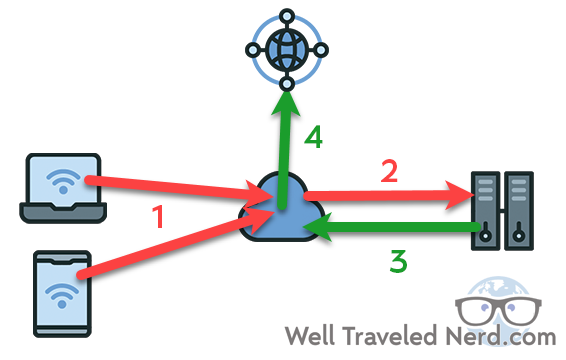In short, a Virtual Private Network or VPN is a way to appear like your internet traffic is coming from a different place. This is a great way to keep your connection safer or avoid restrictions.
A well traveled nerd can use a VPN for a couple different reasons:
- Protection. Let’s say I’ve got to use public WiFi for some reason and I don’t yet have a SIM card. I run my VPN software (either on my laptop or my mobile) and then my browsing is much safer than just connecting “in the raw”.
- Region blocking. I enjoy watching TV shows from England and anime from Japan. Some programs are only available to watch in the home countries. A VPN will let my connection appear to come from that country and let me watch the show I love.
- Avoiding filters. As a photographer, I like to share some of my shots. If I’m at an office or hotel that blocks my photography portfolio’s website (some other photographers feature nudes for example) and I can’t upload my work. I can use a VPN to avoid those restrictions.

How a VPN Works
- You are already connected with your device to the internet and run the VPN software.
- The VPN software on your computer connects you to the destination (your office or a different country).
- The VPN server then redirects your traffic back through the internet as if it’s coming from the VPN server (in that country or specific location).
- The website (or Netflix, etc.) thinks your connecting from wherever the VPN is coming from.
Which VPN Provider Should I Choose?
I’m not going to tell you which one I personally use because I don’t want to bias your research and choice, but I will give you a couple options narrowed my search down to when I was choosing one. These are listed in no particular order with information gathered in December 2020.
- ExpressVPN has more than 3,000 servers in 160 locations in 94 countries. Prices start at about $8.50/month.
- NordVPN has 5,470 servers in 59 countries. Prices start about $3.75/month.
- SurfShark has more than 3,200 servers in 65 countries. Prices start at about $2.21/month.
There are many, many others, but these are the three I considered before making my final decision.
Legality
I’ve been asked a few times if VPNs are legal. Mostly yes. According to cursory research, VPNs are fully or partially illegal in China, Iraq, North Korea, United Arab Emirates, Russia, Iran, Oman, Turkey, and Belarus. If you are not sure if it’s legal in your country, please research this topic before you start using one.
Thanks to my best friend Judy for keeping me from being too technical on this article.

